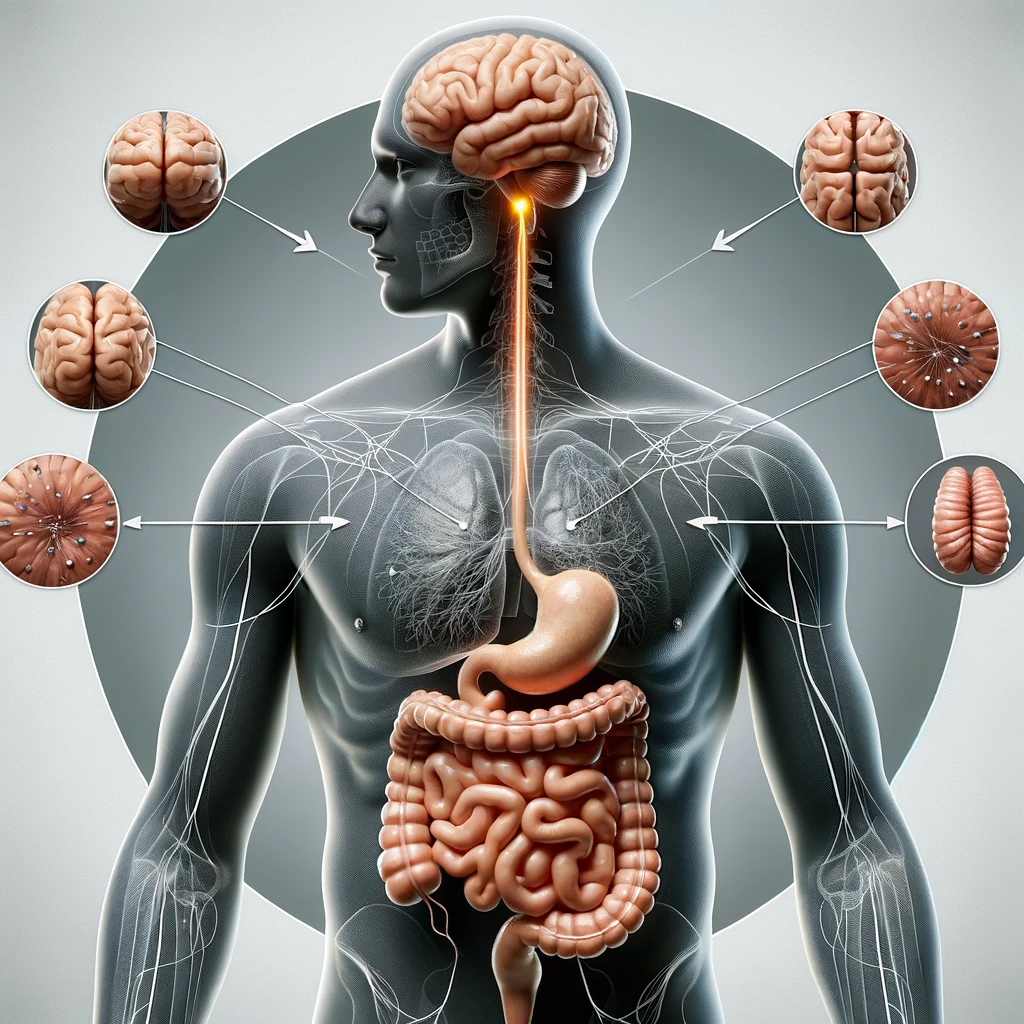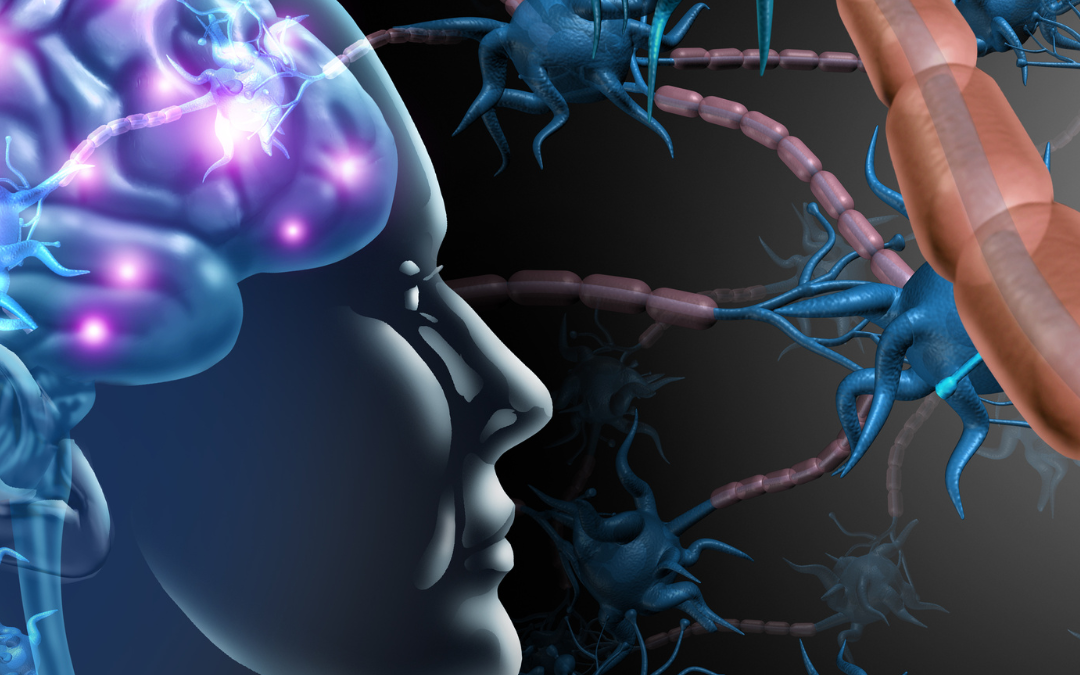Exploring the Gut-Brain Axis
In recent years, the relationship between gut health and mental health has garnered significant attention in both scientific and public domains.
This connection, known as the gut-brain axis, underscores the intricate interplay between our digestive system and brain function.
Understanding this relationship is crucial, particularly in addressing mental health conditions such as anxiety, depression, mood disorders, and cognitive dysfunction.
In this article, we will delve into the components of the gut-brain axis, explore the nervous systems involved, and examine how poor gut health can impact mental well-being.
Understanding the Gut-Brain Axis
The gut-brain axis is a bidirectional communication network that links the enteric nervous system (ENS) of the gastrointestinal tract with the central nervous system (CNS), primarily the brain. This complex system involves multiple pathways, including:
- Neural Pathways: The vagus nerve is the primary neural conduit between the gut and the brain. It transmits signals about the state of the gut to the brain and vice versa.
- Endocrine Pathways: Hormones produced in the gut, such as serotonin and cortisol, play significant roles in mood regulation and stress response.
- Immune Pathways: The gut-associated lymphoid tissue (GALT) and the immune system’s interaction with gut microbiota influence inflammation and immune responses, which can affect brain function.
- Microbiome Pathways: The gut microbiota, consisting of trillions of microorganisms, produces metabolites that can impact brain function and behavior.
The Nervous Systems Involved
Enteric Nervous System (ENS)
The ENS, often referred to as the “second brain,” is a vast network of neurons embedded in the lining of the gastrointestinal system. It operates autonomously to regulate digestive processes but also communicates extensively with the CNS. The ENS influences gut motility, secretion, blood flow, and immune function.
Central Nervous System (CNS)
The CNS, comprising the brain and spinal cord, is the control center for processing sensory information and orchestrating responses throughout the body. It is integral to cognitive function, emotional regulation, and behavioral responses.
Autonomic Nervous System (ANS)
The ANS controls involuntary physiological functions and is divided into the sympathetic and parasympathetic nervous systems. The sympathetic system is associated with the “fight or flight” response, while the parasympathetic system, mediated by the vagus nerve, promotes “rest and digest” activities.

The Impact of Poor Gut Health on Mental Health
Anxiety and Depression
Research has shown a strong correlation between gut health and mental health disorders like anxiety and depression. Dysbiosis, or an imbalance in gut microbiota, can lead to increased intestinal permeability (often referred to as “leaky gut”), allowing pro-inflammatory substances to enter the bloodstream. This inflammation can affect brain function and contribute to mood disorders. Additionally, the majority of the body’s serotonin, a neurotransmitter crucial for mood regulation, is produced in the gut. An unhealthy gut can thus lead to serotonin imbalances, exacerbating symptoms of anxiety and depression.
Mood Disorders
Mood disorders, including bipolar disorder and chronic mood dysregulation, have also been linked to gut health. The gut microbiome produces short-chain fatty acids (SCFAs) through the fermentation of dietary fibers, which have anti-inflammatory properties and can influence brain function. An imbalanced microbiome can reduce SCFA production, leading to increased inflammation and altered mood regulation.
Cognitive Function
Cognitive functions such as memory, attention, and decision-making can be influenced by gut health. Neuroinflammation, stemming from gut-derived inflammatory markers, can impair cognitive processes. Additionally, gut microbiota produce neuroactive compounds like gamma-aminobutyric acid (GABA) and B vitamins, which are essential for cognitive function. Dysbiosis can disrupt the production of these compounds, negatively impacting cognitive performance.
Strategies to Improve Gut Health and Mental Well-Being
Diet:
Consuming a diet rich in fiber, fermented foods, and prebiotics can support a healthy gut microbiome. Foods like yogurt, kefir, sauerkraut, and whole grains promote beneficial bacteria growth.
High-fiber foods such as fruits, vegetables, legumes, and whole grains are essential as they act as prebiotics, feeding the good bacteria in the gut.
Fermented foods like yogurt, kefir, kimchi, and sauerkraut contain live probiotics that can help maintain the balance of gut bacteria.
Additionally, polyphenol-rich foods like berries, green tea, and dark chocolate have been shown to promote gut health by supporting beneficial bacterial growth.
Probiotics and Prebiotics:
Supplements containing probiotics (beneficial bacteria) and prebiotics (fibers that feed these bacteria) can help restore gut balance.
Probiotics are live microorganisms that, when administered in adequate amounts, confer a health benefit on the host. They can be found in fermented foods or taken as supplements. Common strains include Lactobacillus and Bifidobacterium, which have been studied for their role in maintaining a healthy gut environment.
Prebiotics, on the other hand, are non-digestible fibers found in foods like chicory root, garlic, onions, and bananas. They act as food for the probiotics, helping them to thrive and multiply.
Together, probiotics and prebiotics work synergistically to enhance gut health.
Stress Management:
Practices such as mindfulness, meditation, and yoga can reduce stress levels, positively affecting gut health and the gut-brain axis. Chronic stress can disrupt the balance of gut bacteria, leading to issues such as irritable bowel syndrome (IBS) and other gastrointestinal disorders.
Mindfulness and meditation help in reducing the body’s stress response, lowering levels of cortisol (the stress hormone) which can negatively impact gut health.
Yoga and other forms of physical relaxation not only reduce stress but also improve overall circulation and digestion. These practices can enhance the communication between the gut and brain, leading to better mental and digestive health.
Regular Exercise:
Physical activity has been shown to enhance gut microbiota diversity and reduce inflammation, benefiting both gut and mental health.
Regular exercise increases the production of short-chain fatty acids (SCFAs), which are crucial for gut health. SCFAs are produced when the beneficial bacteria in the gut ferment dietary fiber, and they help in reducing inflammation and supporting the integrity of the gut lining.
Exercise also promotes motility, reducing the risk of constipation and other digestive issues. Furthermore, it has been associated with reduced levels of stress and anxiety, contributing to a healthier gut-brain axis.
Adequate Sleep:
Ensuring sufficient and quality sleep supports the body’s natural healing processes and maintains gut health. Poor sleep or sleep disturbances can negatively affect the gut microbiome, leading to an imbalance that may exacerbate gastrointestinal issues. The body’s circadian rhythm, which regulates sleep-wake cycles, also influences the gut microbiome. Disruptions in sleep can lead to alterations in the gut microbiota composition, impacting overall health. Adequate sleep, typically 7-9 hours per night for adults, is essential for maintaining the balance and diversity of gut bacteria, promoting overall well-being.

The gut-brain axis highlights the profound connection between our digestive system and mental health. By understanding and nurturing this relationship, we can take proactive steps to improve both our gut health and mental well-being. As research continues to unravel the complexities of the gut-brain axis, it becomes increasingly clear that maintaining a healthy gut is essential for overall mental health and cognitive function.
By prioritizing a balanced diet, managing stress, staying active, and ensuring quality sleep, we can foster a healthier gut-brain connection and support our mental health in the process.

The Silent Wound: Understanding the Lasting Impact of Childhood Emotional Neglect
Written by Sarah GilliganWhen we think of childhood trauma, we often picture overt abuse—yelling, violence, or abandonment. But there’s another kind of trauma that leaves no visible scars, yet quietly shapes the way we see ourselves and relate to the world:...

The Crucial Role of Nutrition in Mental Health
In today's world, mental health issues are a growing concern, affecting nearly one billion people worldwide. As a clinical nutritionist with a strong focus on personalised nutrition and pathology, I emphasise the importance of identifying key nutrient deficiencies to...
